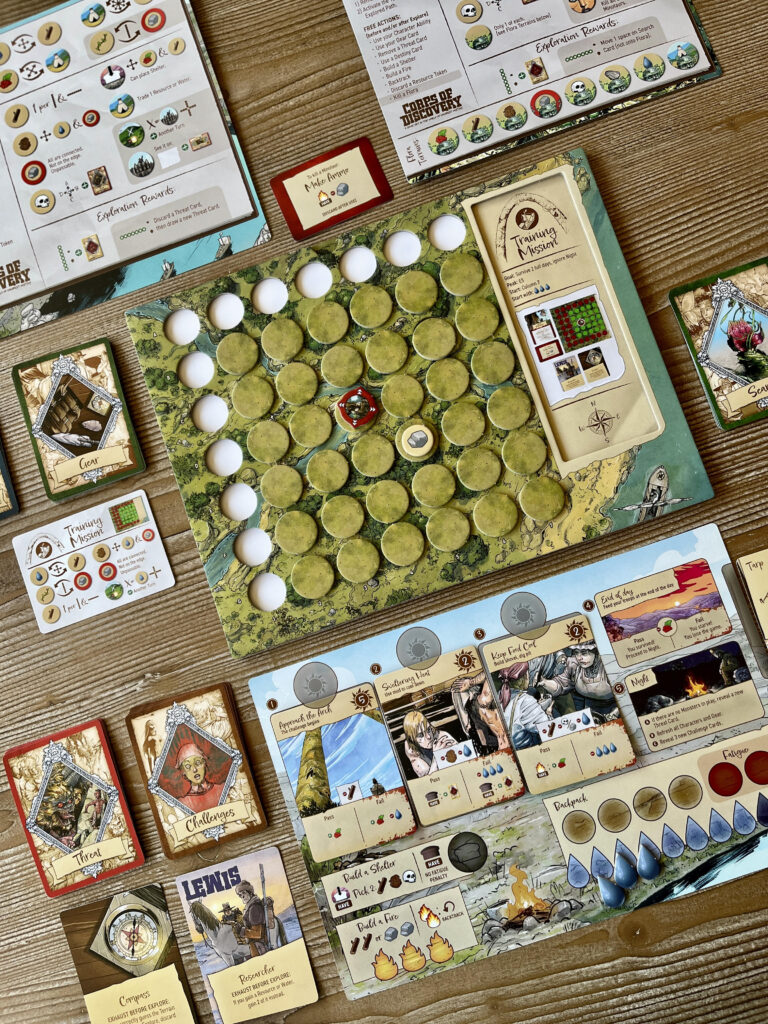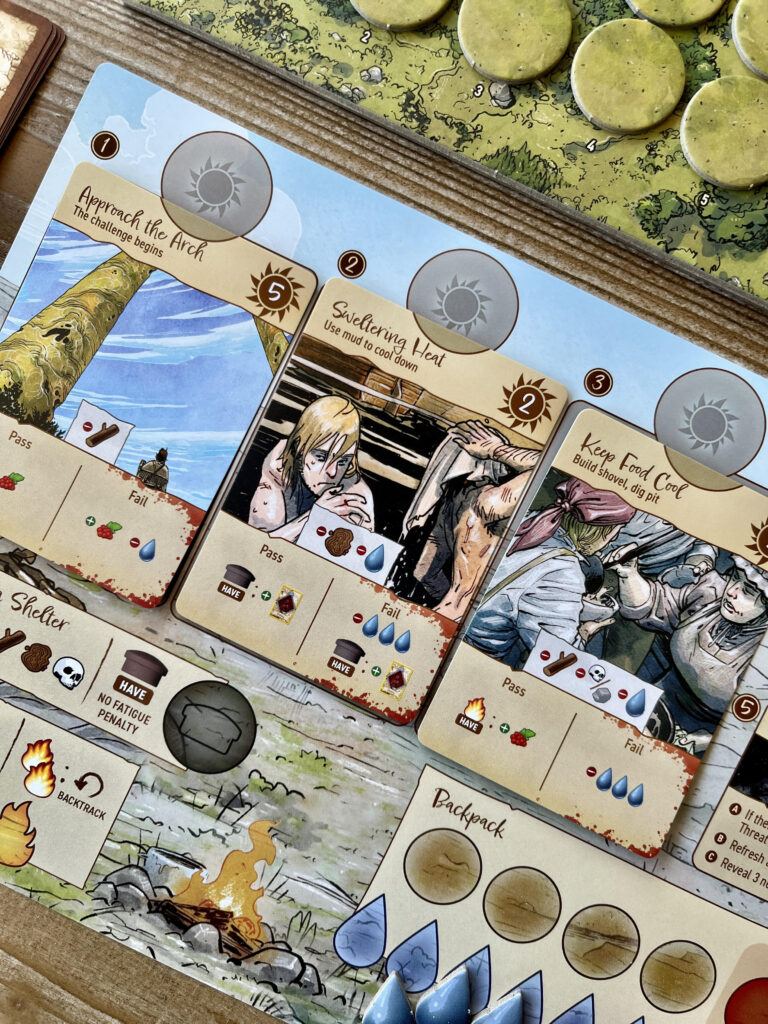I didn’t enjoy this game in an ironic way, or in a it’s-good-even-though, or I-can’t-believe-I-do-but-I-perversely-can’t-help-it or any other oblique or roundabout, halfway indirect from behind kind of way…No. I sat at my table and wolfed this thing straight down over the course of a week.
The comic the game is based on (titled Manifest Destiny) is, honestly, a bit much for me. The gist is it’s a reimagining of the Lewis and Clark expedition, where they and their crew face monstrous creatures and supernatural horrors lurking in the uncharted American frontier, all while drenched in the metaphorical sins of imperialism and manifest destiny itself. It leans hard into the gore and body horror and yeah, it’s making a point, but sometimes it feels like it’s trying a little too hard to gross you out and say something deep at the same time. It’s clever, but it can be exhausting. Full disclosure, I stopped about halfway through.
The game though, I’m happy to say, has a totally different tone. It takes the premise (the haunted wilderness, the unknown frontier) but strips away the noise. It’s not about being edgy or shocking. It’s about getting lost, and trying to find your way around.

Starting with the rulebook, Corps of Discovery has a few stumbling blocks but it was, mercifully, much simpler than Harrow County (a game I also love dearly). My hang ups included sorting through the card decks upon unboxing and setting up the initial Training Mission. The game would probably benefit from just having two rulebooks. One for the general rules and one for the chapter-specific rules and setup. But overall, it’s lean and direct, particularly nice in a hobby that sometimes confuses complexity for depth.
So here’s what it’s like to play: you start by slotting a scenario sheet into the board. There’s a cover so you don’t get to peek at the terrain layout until you’re meant to, which I appreciate. You’re given a place to begin, the location of a “peak” on the map, the logic rules for the scenario and that’s it. Just a sliver of orientation and the awareness that everything else will be a process of trial, error, and deduction.

Every day in the game is tracked by challenge cards (three of them per day) and they’re basically timers mixed with resource tests. When you remove tokens from the map, you’re also feeding them into these cards. Some challenge cards must be completed after 2 turns, and some up to 5. Each one wants specific stuff (wood, mud, vine, whatever) and if you can give it what it asks, you pass. If not, you fail and the game punishes you. Usually by taking your water aka kicking you when you’re already limping.
The challenge cards are stressful in a very thematic way. You’re torn between hoarding resources to meet them or spending those same resources on building tools, shelter, and fires to survive the next turn. Sometimes failing a card on purpose is the smart play because you desperately need that wood to craft something to handle the Minotaur blocking your path. But then, if you overpack your backpack with too many resources, you start hemorrhaging water after every challenge, and that’s a great way to spiral into death after about three turns (unless you have a shelter built, another great way to mitigate the difficulty).

The cards also introduce a bit of randomness into the game that keeps it fresh. I had games where the timing was brutal i.e. drawing cards that demanded four resources when I had only two turns to scrape them together. But it never feels like chaos for chaos’s sake. It’s not unfair. Deep down, I know it’s my fault. If I hadn’t wasted that last turn gathering wood to please some impossible card instead of just letting it go and taking the hit, I wouldn’t be in such a mess now. The punishment fits the crime.
The deeper you go in the map itself, the more you start to realize nothing here is random. Everything obeys a logic. It’s just hidden. If you’re patient, if you pay attention, if you stop flailing and start thinking, the structure starts to reveal itself. You won’t be certain before revealing every space, but that certainty grows as more of the map is revealed. Water’s always next to wood. Each tipi is diagonally adjacent to food…you’re not lost, you’re just blind, and the game quietly teaches you how to see.

Still, Corps of Discovery isn’t here to entertain you like a puppy. It’s not patting your head for just showing up. It doesn’t want to be loved easily. It wants to be understood. And I wanted to understand it. It’s graceful in its austerity. It asks for your attention, and if you can’t give it, the payoff won’t be as satisfying.
It took me six tries before I actually won a game. Yeah, yeah, laugh it up! I’m not the sharpest tool in the shed. I also have the memory of a goldfish so I was able to replay the Training Missions several times, getting a good feel for the game before diving into the first Fauna chapter. I won the majority of the Fauna scenarios, once my I wrapped my mind around the game. More important details for your consideration: I’ve played every Fauna scenario and 60% of the Flora scenarios and I played them all solo. I’m being completely honest when I say I can’t stop.
On top of planning your routes carefully, you’ll be heavily relying on your gear and abilities, not as bonuses, but as lifelines to keep you alive in your desperation. You simply must rely on those to help you through tough moments. This is something I really appreciate. In many games, I almost always forget about my little boon cards, and most games are designed such that those boons arent strictly necessary. In Corps of Discovery that kind of sloth is a death sentence. As far as I can tell, they are fully necessary and I’m desperately waiting on the gear to refresh each round. The game wants you to be fully engaged, using everything at your disposal.

When all the pieces start falling into place, the fog lifts a bit. And when it did for me, I felt like I’d earned something- not a win initially, but a little bit of sight. That sight is addictive. It can’t be cracked with brute force. It needs careful inference and a little bit of restraint.
That’s the real hook: it’s not just about surviving. It’s about seeing the map…really seeing it for what it is, and reading it like a language. It’s not flashy. It’s not bombastic. It’s not going to be for everyone. But if you like slow-burn deduction with actual stakes, it’s a hell of a thing.
But beyond all that, what I love about Corps of Discovery is it’s different. It’s the kind of game that gets me excited for games again. It’s what I loved about Harrow County too. Off The Page Games has quietly become one of the most consistently creative studios in the business. They build games with these strange, beating hearts that take risks, make new shapes, and trust their players to meet them halfway.
In a hobby that sometimes feels like it’s just rotating the same puzzle pieces, Corps of Discovery is the rare thing that feels genuinely new. It’s a game about navigation that carves out new territory of its own.
This was such a great review! Love your passion and enthusiasm for the game!! Thank you!
Came here to enter the giveaway, and then read the whole review instead 😂 I don’t typically love cooperative games, but this one totally has my interest piqued.
I like the way you analyze and share your thoughts of the games.
BTW, i hope I’ll win any orize ofnyour 2k giveaway in IG. My IG user is achavesg